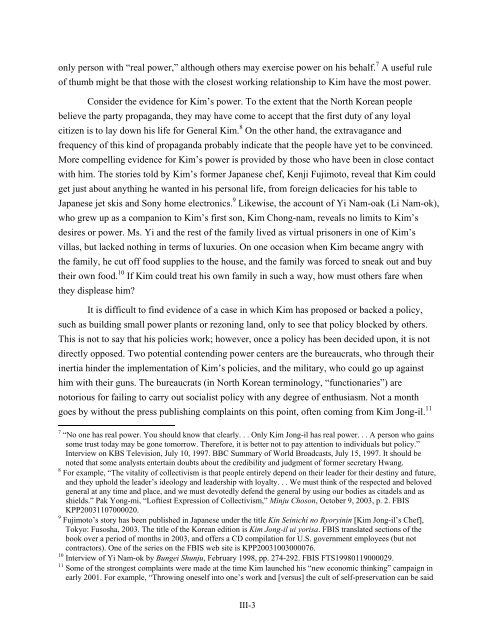North Korean Policy Elites - Defense Technical Information Center
North Korean Policy Elites - Defense Technical Information Center
North Korean Policy Elites - Defense Technical Information Center
You also want an ePaper? Increase the reach of your titles
YUMPU automatically turns print PDFs into web optimized ePapers that Google loves.
only person with “real power,” although others may exercise power on his behalf. 7 A useful rule<br />
of thumb might be that those with the closest working relationship to Kim have the most power.<br />
Consider the evidence for Kim’s power. To the extent that the <strong>North</strong> <strong>Korean</strong> people<br />
believe the party propaganda, they may have come to accept that the first duty of any loyal<br />
citizen is to lay down his life for General Kim. 8 On the other hand, the extravagance and<br />
frequency of this kind of propaganda probably indicate that the people have yet to be convinced.<br />
More compelling evidence for Kim’s power is provided by those who have been in close contact<br />
with him. The stories told by Kim’s former Japanese chef, Kenji Fujimoto, reveal that Kim could<br />
get just about anything he wanted in his personal life, from foreign delicacies for his table to<br />
Japanese jet skis and Sony home electronics. 9 Likewise, the account of Yi Nam-oak (Li Nam-ok),<br />
who grew up as a companion to Kim’s first son, Kim Chong-nam, reveals no limits to Kim’s<br />
desires or power. Ms. Yi and the rest of the family lived as virtual prisoners in one of Kim’s<br />
villas, but lacked nothing in terms of luxuries. On one occasion when Kim became angry with<br />
the family, he cut off food supplies to the house, and the family was forced to sneak out and buy<br />
their own food. 10 If Kim could treat his own family in such a way, how must others fare when<br />
they displease him?<br />
It is difficult to find evidence of a case in which Kim has proposed or backed a policy,<br />
such as building small power plants or rezoning land, only to see that policy blocked by others.<br />
This is not to say that his policies work; however, once a policy has been decided upon, it is not<br />
directly opposed. Two potential contending power centers are the bureaucrats, who through their<br />
inertia hinder the implementation of Kim’s policies, and the military, who could go up against<br />
him with their guns. The bureaucrats (in <strong>North</strong> <strong>Korean</strong> terminology, “functionaries”) are<br />
notorious for failing to carry out socialist policy with any degree of enthusiasm. Not a month<br />
goes by without the press publishing complaints on this point, often coming from Kim Jong-il. 11<br />
7 “No one has real power. You should know that clearly. . . Only Kim Jong-il has real power. . . A person who gains<br />
some trust today may be gone tomorrow. Therefore, it is better not to pay attention to individuals but policy.”<br />
Interview on KBS Television, July 10, 1997. BBC Summary of World Broadcasts, July 15, 1997. It should be<br />
noted that some analysts entertain doubts about the credibility and judgment of former secretary Hwang.<br />
8 For example, “The vitality of collectivism is that people entirely depend on their leader for their destiny and future,<br />
and they uphold the leader’s ideology and leadership with loyalty. . . We must think of the respected and beloved<br />
general at any time and place, and we must devotedly defend the general by using our bodies as citadels and as<br />
shields.” Pak Yong-mi, “Loftiest Expression of Collectivism,” Minju Choson, October 9, 2003, p. 2. FBIS<br />
KPP20031107000020.<br />
9 Fujimoto’s story has been published in Japanese under the title Kin Seinichi no Ryoryinin [Kim Jong-il’s Chef],<br />
Tokyo: Fusosha, 2003. The title of the <strong>Korean</strong> edition is Kim Jong-il ui yorisa. FBIS translated sections of the<br />
book over a period of months in 2003, and offers a CD compilation for U.S. government employees (but not<br />
contractors). One of the series on the FBIS web site is KPP20031003000076.<br />
10 Interview of Yi Nam-ok by Bungei Shunju, February 1998, pp. 274-292. FBIS FTS19980119000029.<br />
11 Some of the strongest complaints were made at the time Kim launched his “new economic thinking” campaign in<br />
early 2001. For example, “Throwing oneself into one’s work and [versus] the cult of self-preservation can be said<br />
III-3













